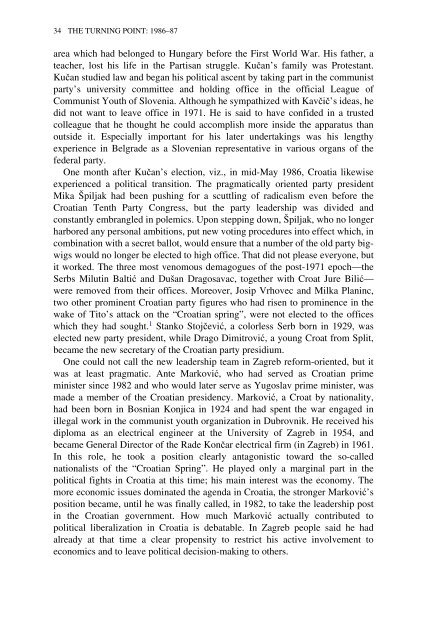Yugoslavia: A History of its Demise - Indymedia
Yugoslavia: A History of its Demise - Indymedia
Yugoslavia: A History of its Demise - Indymedia
Create successful ePaper yourself
Turn your PDF publications into a flip-book with our unique Google optimized e-Paper software.
34 THE TURNING POINT: 1986–87<br />
area which had belonged to Hungary before the First World War. His father, a<br />
teacher, lost his life in the Partisan struggle. Kučan’s family was Protestant.<br />
Kučan studied law and began his political ascent by taking part in the communist<br />
party’s university committee and holding <strong>of</strong>fice in the <strong>of</strong>ficial League <strong>of</strong><br />
Communist Youth <strong>of</strong> Slovenia. Although he sympathized with Kavčič’s ideas, he<br />
did not want to leave <strong>of</strong>fice in 1971. He is said to have confided in a trusted<br />
colleague that he thought he could accomplish more inside the apparatus than<br />
outside it. Especially important for his later undertakings was his lengthy<br />
experience in Belgrade as a Slovenian representative in various organs <strong>of</strong> the<br />
federal party.<br />
One month after Kučan’s election, viz., in mid-May 1986, Croatia likewise<br />
experienced a political transition. The pragmatically oriented party president<br />
Mika Špiljak had been pushing for a scuttling <strong>of</strong> radicalism even before the<br />
Croatian Tenth Party Congress, but the party leadership was divided and<br />
constantly embrangled in polemics. Upon stepping down, Špiljak, who no longer<br />
harbored any personal ambitions, put new voting procedures into effect which, in<br />
combination with a secret ballot, would ensure that a number <strong>of</strong> the old party bigwigs<br />
would no longer be elected to high <strong>of</strong>fice. That did not please everyone, but<br />
it worked. The three most venomous demagogues <strong>of</strong> the post-1971 epoch—the<br />
Serbs Milutin Baltić and Dušan Dragosavac, together with Croat Jure Bilić—<br />
were removed from their <strong>of</strong>fices. Moreover, Josip Vrhovec and Milka Planinc,<br />
two other prominent Croatian party figures who had risen to prominence in the<br />
wake <strong>of</strong> Tito’s attack on the “Croatian spring”, were not elected to the <strong>of</strong>fices<br />
which they had sought. 1 Stanko Stojčević, a colorless Serb born in 1929, was<br />
elected new party president, while Drago Dimitrović, a young Croat from Split,<br />
became the new secretary <strong>of</strong> the Croatian party presidium.<br />
One could not call the new leadership team in Zagreb reform-oriented, but it<br />
was at least pragmatic. Ante Marković, who had served as Croatian prime<br />
minister since 1982 and who would later serve as Yugoslav prime minister, was<br />
made a member <strong>of</strong> the Croatian presidency. Marković, a Croat by nationality,<br />
had been born in Bosnian Konjica in 1924 and had spent the war engaged in<br />
illegal work in the communist youth organization in Dubrovnik. He received his<br />
diploma as an electrical engineer at the University <strong>of</strong> Zagreb in 1954, and<br />
became General Director <strong>of</strong> the Rade Končar electrical firm (in Zagreb) in 1961.<br />
In this role, he took a position clearly antagonistic toward the so-called<br />
nationalists <strong>of</strong> the “Croatian Spring”. He played only a marginal part in the<br />
political fights in Croatia at this time; his main interest was the economy. The<br />
more economic issues dominated the agenda in Croatia, the stronger Marković’s<br />
position became, until he was finally called, in 1982, to take the leadership post<br />
in the Croatian government. How much Marković actually contributed to<br />
political liberalization in Croatia is debatable. In Zagreb people said he had<br />
already at that time a clear propensity to restrict his active involvement to<br />
economics and to leave political decision-making to others.
















